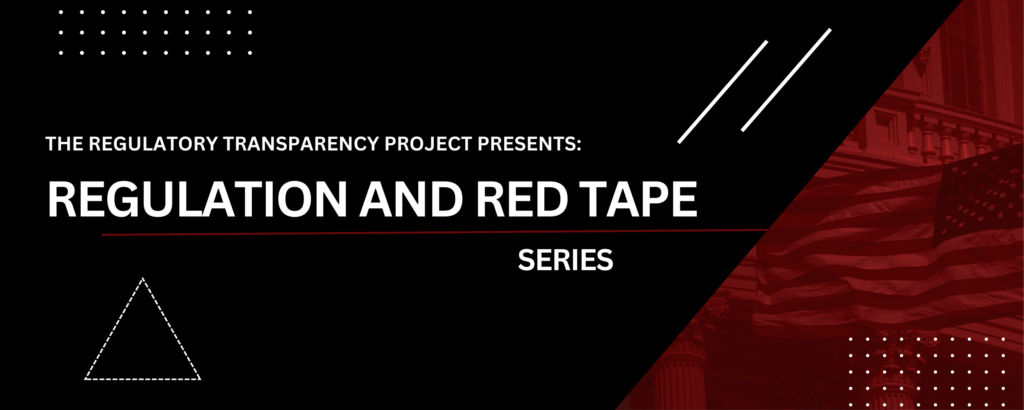Series Trailer
In this new video series from the Regulatory Transparency Project, leading legal experts will debate some of the most controversial regulatory issues in America today. Moderated by the Hon. Paul J. Ray, “Regulation and Red Tape” will tell true stories of how federal regulatory actions impact the lives of ordinary Americans and the economy they rely on. In watching this series, you will have the opportunity to learn more about how the regulatory process functions, consider how and when regulatory action is necessary, and evaluate the trade-offs involved when the regulatory state acts.
Episode 1 – Mergers, Monopolies, and the FTC
Since the 19th century, the United States government has intervened to combat the growth of monopolies in our economy. The stakes in these interventions are high. Without government oversight, monopolies can stifle competition, and raise prices for Americans. But with excessive intervention, the government can also damage the economy by preventing companies from growing and innovating. This has led to an ongoing debate on the best strategy for regulating mergers. When should the government stop two companies from joining forces to prevent economic domination and the suppression of competition? When should the government step back and allow companies to join together to promote growth and innovation?
In this first episode of the “Regulation and Red Tape” series, antitrust experts address these questions and consider the impact of the FTC’s proposed merger guidelines.
Episode 2 – Sackett v. EPA: A Tale of Wetland Regulations
At what point can Americans go to court to defend themselves against agency enforcement action?
This crucial question arose for the Sackett family when they embarked on the initial stages of constructing their home near Priest Lake, Idaho. EPA agents arrived on their property and asserted that it was a federally protected wetland. The EPA subsequently issued a compliance order that would subject the Sacketts to a fine of $37,500 a day. What followed was years of legal battles between the Sackett family and the EPA, culminating in two pivotal Supreme Court decisions.
In the second episode of the “Regulation and Red Tape” series, experts delve into the story of the Sackett family, their experience with the EPA, and the due process questions raised by the story.
Episode 3 – Boucher v. USDA: Navigating the Swampbuster Provisions
Have you ever received a notice from the government that you violated a rule that you didn’t know about?
In the 1990’s, the Boucher family removed nine trees from their property as an attempt to mitigate the buildup of trash and dumping on their land. This action triggered a United States Department of Agriculture (USDA) investigation suspecting environmental damage. Consequently, the Bouchers lost eligibility for USDA benefits, including “Swampbuster” provisions. In Boucher vs. USDA, the government grapples with balancing natural resource protection and individual liberties. This case underscores the long and painstaking nature of government processes, emphasizing the time and diligence often required for justice and good governance.
In the third episode of “Regulation and Red Tape,” experts highlight the broader implications of Boucher vs. USDA and consider the balance between regulatory enforcement and individual rights.
Episode 4 – Tax Inversions: Unpacking the Pfizer Case
In 2014, the pharmaceutical company Pfizer initiated a restructuring, only to encounter impediments from the United States Department of the Treasury, further halting any prospective Congressional action. During this period, the United States had among the highest corporate income tax rates in the world, prompting the Department of the Treasury to scrutinize Pfizer’s actions, characterizing them as an attempted tax inversion. The IRS, in the face of a gridlocked Congress, issued a notice of proposed rulemaking that would begin altering regulations, thereby thwarting numerous existing structures, including Pfizer’s proposed transaction, from securing approval.
In episode four of the “Regulation and Red Tape ” series, experts provide an exposition of corporate tax inversions, spotlighting Pfizer’s case, and raise pivotal questions concerning the balance of powers when time-sensitive policy matters are at stake.
Episode 5 – TARP: Examining the 2008 Bank Rescue Plan
In October of 2008, the United States faced a recession that some experts warned would rival the Great Depression. In an effort to address the nation’s financial panic, Congress passed the Troubled Asset Relief Program (TARP) with the intention of stabilizing the financial system. The federal government hoped that by providing billions of dollars in capital to the largest US banks, consumers would trust the banks and prevent further financial crises. The success of TARP is still debated today by experts on both sides of the issue. Did TARP save the economy, or was it an excessive government intervention?
In the final episode of the “Regulation and Red Tape” series, experts address this question and more as they weigh the government response and the lasting impact of TARP on the financial industry.


